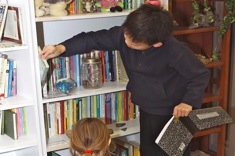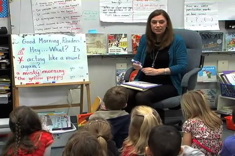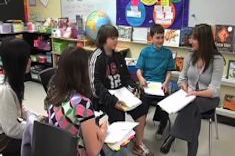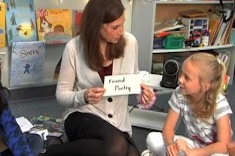“Poetry Bands, take your places. It’s time to begin,” I announce to my eager and anxious poets.
It is a warm and sunny Thursday morning in early June. Fourth graders are getting ready to perform at our “Poetry Coffeehouse,” which is the culmination of a yearlong study of poetry, art, and music instruction. The wall decor and our poetry have a symbiotic relationship: some of the children’s art was inspired by poetry, and some of the poetry was inspired by their artwork. Shakers, kalimbas, tambourines and other percussion instruments from music class are held in their excited hands to give “enthusiasm and appreciation” to each poet.
Our poet in residence, Elizabeth Gordon McKim, known affectionately as “Ms. Liz” to the students, is in the front row, waiting with bated breath to hear each poet perform his/her work. The parents have brought in muffins, fruit, and coffee. They are seated in student chairs around the room, waiting for the performance to begin. As the bands take their places, the first poet approaches the microphone, and the show begins.
Getting to this point where students see themselves as poets has taken intentional planning to infuse poetry into many parts of our curriculum throughout the year.
Poetry Fridays
I learned about Poetry Fridays at a conference where Georgia Heard was the keynote speaker. She suggested Poetry Fridays as a way to incorporate poetry into the writer’s workshop model of instruction in a very manageable and meaningful way for ultimate student achievement. Poetry Friday fosters a love of poetry right from the beginning of the school year, rather than waiting until late in the school year when all of the state mandated testing is complete.
Each month, students study a different poet or form of poetry. They read poems, research the poet, write in the style of the poet, or in their own style, and illustrate their work. Sometimes their poems are published on the classroom blog. Eventually all of the poems are hung in the Poet’s Corner in clear pocket protectors for all to see. The poems remain in the pockets until the end of the school year, when they are bound into a journal with a dedication page and extra pages for future work.
We study a wide range of poets from the classical to the modern. Students always have a book of poetry in their book bag and are strongly encouraged to share poems that they enjoy. They have a section of their writer’s notebook devoted to poetry, and a poetry folder dedicated to keeping poems and other notes about poets. Students look forward to Poetry Fridays, and the break it provides from the routine of writer’s workshop.
Poet-in-Residence
For the past 11 years, the fourth graders have had the opportunity to work with a poet in residence. Elizabeth Gordon McKim is a poet in the oral tradition and has been working with children and teachers for the over 40 years. She is the Poet Laureate at the European Graduate School in Switzerland and on the faculty of Lesley University in Boston. As the poet in residence, she works with children in a workshop environment in which they incorporate several types of poetry (odes, haiku, I am, you are, and acrostic) to create poems of praise. Often the children create poems of praise for moms or mother earth. The students spend time individually discussing their poems with Ms. Liz.
At the end of each workshop, Ms. Liz instructs the children on how to perform poetry in the oral tradition, and several students come forward to perform their work from the day. The audience is also given instruction on how to respond to an oral poem and how to get involved actively in the art of performance poetry. Ms. Liz inspires each child to write thoughtful and personal poems that showcase individual talents and abilities. They are enthralled by the fact that she is a “real live poet,” and that she makes her living writing and performing poetry. More than one parent has contacted me to tell me how much they were moved and in awe of the poetry that their child had written while working with Ms. Liz. She is able to get the children to write poems in a way that is so different from my instruction that the experience is an invaluable one that the children remember for a very long time!
Rock Poetry
To prepare for an at-home language arts project called rock poetry, each student chooses a song that they like, has the lyrics approved by their families and me, and then analyzes it poetically. They consider whether the lyricist is stating feelings, talking to someone, or telling a story. They look for rhyme patterns, alliteration, and rhythm. One Poetry Friday is devoted to “Rock Poetry Day” when students are encouraged to wear concert t-shirts to school if they have them, or to create a rock shirt. I must admit, I struggle every year with which of my ‘80s bands t-shirts to wear. Sometimes it’s KISS, or Heart, or the Police. This year it was a tie-dyed t-shirt from The Rock and Roll Hall of Fame. The children love the relaxed atmosphere of the day, and I always put together a play list of the songs.
Before we begin, each student gathers 12-14 pieces of plain white copy paper and staples them on one side to create a visual dictionary. Then they gather drawing supplies like markers, crayons or colored pencils. As each song is played, the students draw a picture of images created in their mind by the poem/song. At the end of the poem/song, each student holds up their drawing, and we talk about the images that were created. The student who is presenting their poem/song then discusses their analysis of meaning. This activity incorporates many standards: writing, analyzing poetry, speaking to an audience, and theme of poetry, not to mention the music standards that are incorporated into this activity. It’s a lot of fun and a great way to examine the poetry of music. It’s a great cross-curricular activity incorporating reading, writing, music and art. Besides, I love getting to blast KISS the first thing in the morning!
The Celebration
In early June, the Poetry Coffeehouse takes place. We transform each room into a coffeehouse, putting desks into groups and covering them with tablecloths in order to create a more intimate atmosphere. We group the children into “Poetry Rock Bands,” and have them choose a name. In addition to the students’ instruments, we also put baskets of instruments on the tables for the families to use during the performance. These traditions have become a part of the Poetry Coffeehouse every year.
For the performance, each student chooses a poem from their poetry journal, which is the collection of poems from the year. Each child “occasions” their poem before presenting at the microphone. To occasion a poem, the poet introduces himself/herself, states the type of poem they are going to perform and why they wrote that particular poem. All of the poems are the children’s original work. Before each poet recites, the band and audience provides enthusiasm, which involves playing instruments, and at the end of the band’s performance, everyone in the audience provides “appreciation,” playing instruments and applauding, while the band takes a bow. After all of the bands have performed, each band returns to the microphone to participate in the “Haiku Holler.” The Haiku Holler links haikus each band has written based on a particular theme, like sports, zoo animals, and friends. These often solicit much laughter or tears, like when one band performed haikus about their moms.
In true coffeehouse style, there is an open microphone portion at the end of the performance. Ms. Liz performs, the teacher performs, and some brave parents even step up to the microphone to perform. It is always wonderful to see how excited the children become when a parent approaches the microphone. When we are all done, Ms. Liz travels to the next classroom and the children can enjoy some small treats with their parents as they share their poetry journals and escort them around the classroom to look at all of their artwork. It is different from a celebration of “authors.” It’s a celebration of poets, and it is a highlight of the school year.
Lifelong Poets
The goal of my poetry instruction is to create lifelong poets: not just readers of poetry, but writers and performers of poetry. This is accomplished in a variety of ways across the curriculum and throughout the different disciplines. For me, the single most important ingredient in effective poetry instruction is for my students to know that I love poetry and I am a poet too!









